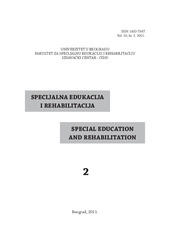Приказ основних података о документу
Conceptual adaptive skills in children with intellectual disabilities
Konceptualne adaptivne veštine kod dece sa intelektualnom ometenošću
| dc.creator | Banković, Slobodan | |
| dc.creator | Japundža-Milisavljević, Mirjana | |
| dc.creator | Brojčin, Branislav | |
| dc.date.accessioned | 2021-06-09T13:44:37Z | |
| dc.date.available | 2021-06-09T13:44:37Z | |
| dc.date.issued | 2011 | |
| dc.identifier.issn | 1452-7367 | |
| dc.identifier.uri | http://rfasper.fasper.bg.ac.rs/handle/123456789/533 | |
| dc.description.abstract | In the second half of 20th century the concept of adaptive behaviour became a constituent part of almost every definition of intellectual disability. Throughout the time, evaluation of this aspect of behaviour became an efficient method of structuring the content of training and the programme of education for persons with intellectual disability. In considering support needs which ought to be provided to these persons, the evaluation of adaptive behaviour can be utilised as an indirect measurement of those needs. The objective of this work is to perceive aspects of adaptive behaviour related to conceptual skills as well as possibilities of evaluation and treatment of respective components of these skills in children with intellectual disabilities. According to the American Association on Mental Retardation (present name the American Association of Intellectual and Developmental Disabilities) conceptual adaptive skills comprise communication, functional academic skills and skills of self-direction (AAMR, 2002). Stated aspects of conceptual skills are further divided into a considerable number of respective skills necessary for successful performance in everyday life. The research in the area of conceptual skills in children with intellectual disabilities, apart from documenting the existing limitations of certain aspects of these skills, offers an insight in manners in which adaptational functioning of these children can be enhanced. Creation and applicability of various approaches in encouraging functional academic skills, or approaches which decrease academic requests for children with intellectual disabilities, can assure necessary support to these students at integration into regular educational and broader social surroundings. By using different instruments and/or forms of evaluation, a comprehensive team evaluation is to be the initial step in forming such approaches. Consideration of the achieved level of mastery of specific skills within their development continuum enables orientation of treatment and teaching goals towards further development of the skill. | en |
| dc.description.abstract | U drugoj polovini 20. veka koncept adaptivnog ponašanja postaje sastavni deo gotovo svih definicija intelektualne ometenosti. Procena ovog aspekta ponašanja vremenom je postala efikasno sredstvo za strukturiranje sadržaja obuke i programa edukacije za osobe sa intelektualnom ometenošću. Prilikom sagledavanja potreba za podrškom koju treba pružiti ovim osobama, procena adaptivnog ponašanja se može koristiti kao indirektna mera tih potreba. Cilj ovog rada je da se sagledaju aspekti adaptivnog ponašanja koji se odnose na konceptualne veštine, kao i mogućnosti procene i tretmana pojedinih komponenti ovih veština kod dece sa intelektualnom ometenošću. Prema Američkoj asocijaciji za mentalnu retardaciju (sadašnji naziv Američka asocijacija za intelektualnu ometenost) konceptualne adaptivne veštine obuhvataju komunikaciju, funkcionalne akademske veštine i veštine samousmeravanja (AAMR, 2002). Navedeni aspekti konceptualnih veština dalje se razlažu na veliki broj pojedinačnih veština potrebnih za uspešno funkcionisanje u svakodnevnom životu. Rezultati istraživanja u oblasti konceptualnih veština kod dece sa intelektualnom ometenošću, pored dokumentovanja postojećih ograničenja u pojedinim aspektima ovih veština, pružaju uvid u načine na koje se može poboljšati njihovo adaptivno funkcionisanje. Kreiranje i primena različitih pristupa u podsticanju funkcionalnih akademskih veština, ili pristupa kojima se umanjuju akademski zahtevi za učenike sa intelektualnom ometenošću, mogu im obezbediti nepohodnu podršku pri uključivanju u redovno obrazovno okruženje i širu društvenu sredinu. Timska sveobuhvatna procena, uz korišćenje različitih instrumenata i/ili vidova evaluacije, trebalo bi da bude prvi korak u kreiranju takvih pristupa. Sagledavanje dostignutog nivoa ovladanosti određenom veštinom, unutar njenog razvojnog kontinuuma, omogućava usmeravanje ciljeva tretmana i nastave ka daljem razvoju te veštine. | sr |
| dc.publisher | Univerzitet u Beogradu - Fakultet za specijalnu edukaciju i rehabilitaciju, Beograd | |
| dc.relation | info:eu-repo/grantAgreement/MESTD/Basic Research (BR or ON)/179017/RS// | |
| dc.rights | openAccess | |
| dc.rights.uri | https://creativecommons.org/licenses/by-sa/4.0/ | |
| dc.source | Specijalna edukacija i rehabilitacija | |
| dc.subject | intellectual disabilities | en |
| dc.subject | adaptive behaviour | en |
| dc.subject | conceptual skills | en |
| dc.subject | evaluation | en |
| dc.subject | instruction | en |
| dc.subject | intelektualna ometenost | sr |
| dc.subject | adaptivno ponašanje | sr |
| dc.subject | konceptualne veštine | sr |
| dc.subject | procena | sr |
| dc.subject | podučavanje | sr |
| dc.title | Conceptual adaptive skills in children with intellectual disabilities | en |
| dc.title | Konceptualne adaptivne veštine kod dece sa intelektualnom ometenošću | sr |
| dc.type | article | |
| dc.rights.license | BY-SA | |
| dc.citation.epage | 317 | |
| dc.citation.issue | 2 | |
| dc.citation.other | 10(2): 301-317 | |
| dc.citation.rank | M51 | |
| dc.citation.spage | 301 | |
| dc.citation.volume | 10 | |
| dc.identifier.fulltext | http://rfasper.fasper.bg.ac.rs/bitstream/id/6057/Untitled9.pdf | |
| dc.identifier.rcub | https://hdl.handle.net/21.15107/rcub_rfasper_533 | |
| dc.type.version | publishedVersion |


